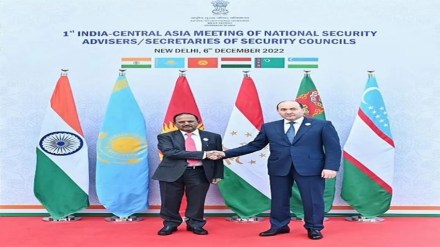By Dr Pravesh Kumar Gupta
Relations between India and the Central Asian republics (CARs) have strengthened after Prime Minister Narendra Modi visited these nations in 2015. Further, by signing a memorandum of obligations in Tashkent, Uzbekistan, in June 2016, New Delhi formally started the process of joining the SCO as a full member. The SCO has given New Delhi an essential forum for constant discussions with Central Asian nations on the sidelines of SCO meetings. In continuation of its outreach to the region, India-Central Asia Dialogue at the foreign ministers level was started in January 2019. Furthermore, initiating a leaders’ summit between New Delhi and the CARs in January 2022 has enhanced multilateral cooperation between India and Central Asia.
As a result of the First India-Central Asia Summit, at which all leaders agreed to hold regular meetings between the heads of national Security in their respective countries, the National Security Advisors/Secretaries (NSAs) of India and Central Asian countries met for the first time in Delhi on December 6, 2022. Mr. Ajit Doval, India’s National Security Advisor, chaired the meeting, which was attended by his counterparts from five Central Asian nations, except for Turkmenistan, which was represented by its ambassador in New Delhi, MR Shalar Geldynazarov.
Regional security challenges took centre stage in the discussion. Tajikistan, Turkmenistan, and Uzbekistan all border Afghanistan directly. Therefore, any developments there affect all three of those nations. Similarly, the Af-Pak region seriously threatens India’s domestic Security. As a result, the decision to schedule regular meetings between the national security chiefs of India and the CARs is a big step toward enhancing cooperation on issues like connectivity and common security challenges.
The NSAs released a joint statement after their meeting that concentrated on regional security challenges, including Afghanistan and counterterrorism. They criticised all forms and manifestations of terrorism and emphasised the need for effective cooperation in the struggle against the danger presented by terrorism. Participants emphasised the necessity of teamwork in the fight against terrorism and the funding of terrorism, as well as the fact that terrorists shouldn’t be trained or harboured in countries like Afghanistan. Ajit Doval, the NSA of India, also spoke on the importance and relevance of UN Security Council Resolution 2593, which aims to stop the Taliban-led Afghanistan from becoming a haven for terrorists and a breeding ground for terrorism that might endanger other nations, including India.
Given the humanitarian disaster that has resulted from the Taliban’s rule, NSAs agreed to coordinate to assist Afghanistan. Despite its unwillingness to connect with the Taliban leadership, India has sent food grains and medicines to Afghanistan. Similarly, Central Asian nations, notably Uzbekistan, have been working together to expedite the delivery of humanitarian supplies to Afghans through its UN-recognized international transport and logistical centre at Termez.
Connectivity is another problem that has long impeded ties between India and Central Asia. India invested in the Iranian port of Chabahar and the international North South Transport Corridor (INSTC) to address the connectivity issue. The Ashgabat Agreement, which facilitates the movement of products among members, was also signed by New Delhi. Connectivity between India and Central Asia remains delayed despite numerous initiatives. The NSAs/Secretaries of Central Asia who participated in the meeting agreed that greater connectivity must be given high priority to increase economic and commercial links between India and the region. They also concurred that connectivity projects should respect all nations’ territorial integrity and sovereignty, be accessible to various participants, and be financially sustainable. This was an allusion to China’s Belt and Road project (BRI).
The present Taliban administration in Kabul has commended India for hosting the first gathering of Central Asian national security advisers. Furthermore, it said that no agency or authority would be permitted to utilise its territory to intervene in the internal affairs of another country. The Taliban leadership has supported the plan to boost regional security cooperation. It also backed a joint declaration favouring a secure, united, peaceful, and stable Afghanistan.
The importance of the summit was covered extensively in the Central Asian media outlets as well. According to the President of Kazakhstan’s official website, the Republic of Kazakhstan’s initiative to establish a Network of Regional Centers for Disease Control and Biosafety under the auspices of the UN, as well as to establish a particular multilateral body – the International Agency for Biological Safety (IABS) – was a significant initiative that all other participants had taken note of. Another Central Asian nation, Kyrgyzstan, declared 2022 to be the year of sustainable mountain development, while Uzbekistan emphasised the significance of the Multifunctional Transport and Logistics Hub in Termez for the delivery of humanitarian supplies to Afghanistan.
The meeting of national security advisers from India and Central Asian nations addressed some important issues. It opened up a new line of communication between Delhi and CARs, which is essential for assessing bilateral and multilateral ties. As was previously said, it resulted from the first leaders’ summit between India and Central Asia. As a result, New Delhi must continue to promote expanding cooperation with Central Asia through all of its communication channels.
(Author is Senior Research Associate (Central Asia), Vivekananda International Foundation, New Delhi.)
Disclaimer: Views expressed are personal and do not reflect the official position or policy of Financial Express Online. Reproducing this content without permission is prohibited.
